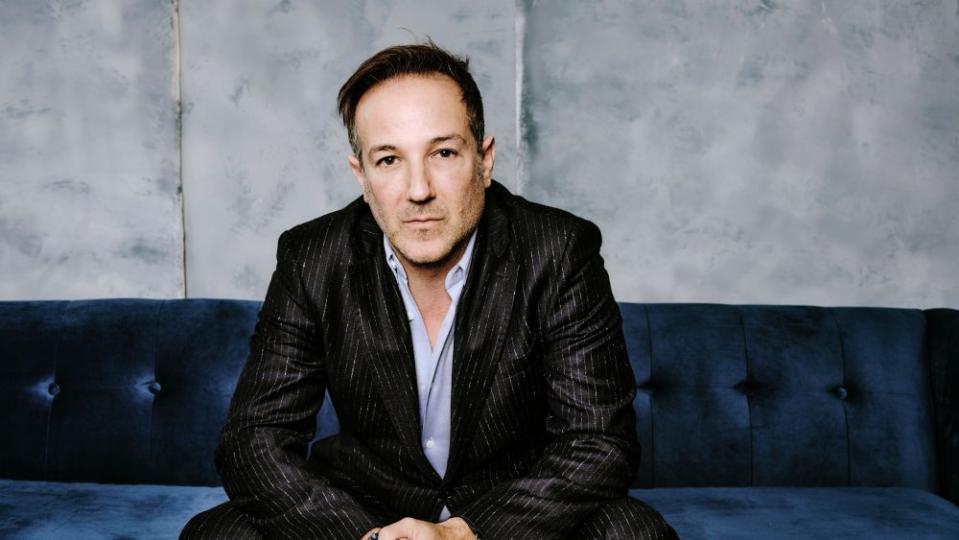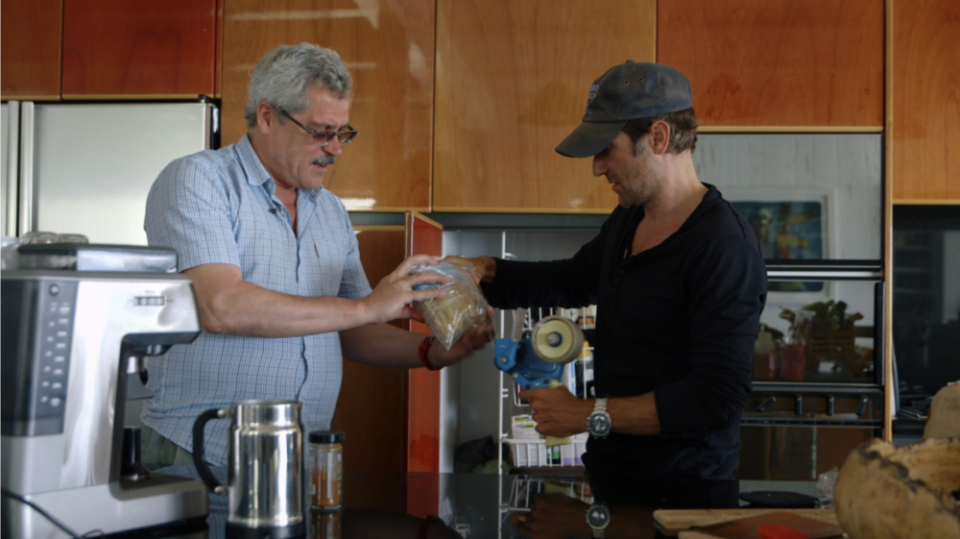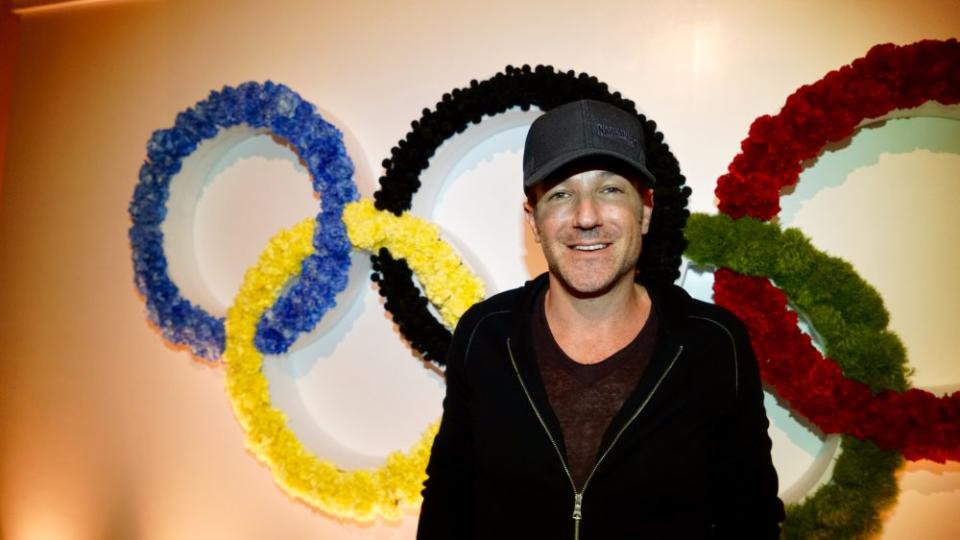Telluride Premieres ‘Icarus: The Aftermath,’ Oscar Winner Bryan Fogel’s Follow Up On Man Who Exposed Russia’s Massive Athletics Doping Scheme
- Oops!Something went wrong.Please try again later.
- Oops!Something went wrong.Please try again later.

Vladimir Putin demands absolute fealty to the Russian state, and woe to anyone who defies him.
Oil executive Ravil Maganov, whose company had criticized the Russian invasion of Ukraine, took a fatal nosedive earlier this week from the window of a Moscow hospital, in what – charitably – has been termed mysterious circumstances.
More from Deadline
Was Maganov’s name engraved on a Kremlin enemies list? Maybe so, maybe not. But one man who can be certain the Kremlin would like him dead is the Russian chemist Dr. Grigory Rodchenkov, who used to run his nation’s athletics anti-doping laboratory. As documented in the 2018 Oscar-winning film Icarus, Rodchenkov blew the whistle on Russia’s elaborate scheme to cheat on drug tests before Olympic and other world sporting competitions, a devious system that the chemist himself had implemented.

Michael Buckner/Deadline/Shutterstock
Rodchenkov fled to the United States and went into hiding in the midst of making the documentary directed by Bryan Fogel. But what has happened to him since? The new documentary Icarus: The Aftermath answers that question. Fogel’s follow up premiered Friday night at the Telluride Film Festival.
“We’ve kept the film very tightly under wraps for the last four and a half years that we were working on it, really, which began almost immediately after Icarus was released,” Fogel tells Deadline. “We kept it under wraps largely due to security concerns.”
The film reveals Rodchenkov has been living like a hunted man, forced to relocate frequently within the U.S., lest potential Russian assassins track him down. He left his family behind in Russia, yet doesn’t regret exposing his country’s doping perfidy. Rodchenkov remains a staunch critic of the way his homeland is being run.
“The problem of Russia is no one can tell the truth. This is still Soviet attitude,” he says in the documentary. “In Russia, history is falsified. I’m against systematic lying.”
Fogel could communicate with Rodchenkov periodically over the internet, and see him in person, but only on rare occasions (each visit carried the risk of exposing his location). Capturing Rodchenkov’s life day to day became the responsibility of cinematographer Jake Swantko, who describes it as “sort of like this embed process.” Swantko came away impressed with Rodchenkov’s capacity to maintain a positive outlook.
“Grigory is one of these types of people who takes any sort of situation and finds the light in it. I know that’s a bit of a cliche, but I’ve never met somebody more optimistic,” he says. “Even under tremendous pressure — not seeing his family for as long as he has and not knowing where he’s going to be living the next day or where money’s coming from — he is a beacon of optimism… He is just a great testament to a spirit that can be undeterred.”

Orwell Films
The film follows Rodchenkov as the scientist copes with two preoccupations – seeking political asylum in the U.S. and being reunited with diaries he has kept faithfully for over 40 years. He was able to take a few volumes of the diary with him when he left Russia in a hurry, but most of them remained in a secret location back home. The diaries meant so much to him that being cut off from them felt like losing a limb.
In a bit of subterfuge worthy of James Bond, Rodchenkov succeeded in sneaking his diaries out of Russia. The entries contain a wealth of information detailing Russia’s longstanding efforts to elude anti-doping measures. For instance, Rodchenkov recounts that before the 1988 Summer Olympic Games in Seoul, Russia dispatched a ship to South Korea that carried a device necessary for its doping maneuvers. The machine was ingeniously disguised to resemble an espresso maker.
Fogel says he found it stunning to interview Rodchenkov about these brazen incidents.
“It was this constant like, ‘You did what in Korea? There’s an espresso machine?’ ‘Yes, an espresso machine,’” Fogel recounts Rodchenkov saying. “’And what is your job on the ship?’ ‘I’m like [an espresso] technician.’”
In another example, Rodchenkov shares his discovery that doped up male athletes could fool metabolite studies by mixing steroids with Chivas Regal. For women athletes, the preferred cocktail was a martini and steroids. Yet another anecdote involved a protocol whereby athletes quickly guzzled beers after a sporting event, then voided their bladders into their track suits before taking a urine test. End result?
“There’s going to be so little traces [of illegal substances] left in your urine that you’re going to be clean,” Fogel says. “I mean, it is absurd the schemes that he was coming up with.”
Those schemes were overseen by Russia’s Ministry of Sport, Rodchenkov says, and he insists the mandate to cheat came from even higher up, from Putin himself. His lawyer appeared on Capitol Hill in 2018, saying Rodchenkov was compelled to go along with the doping program.

Netflix
“Let me be clear about this,” attorney Jim Walden testified, “Dr. Rodchenkov had no choice but to participate in this system if he wanted to stay alive.”
Rodchenkov’s bold decision to blow the whistle made him a villain in Putin’s Russia. He became perhaps the country’s most wanted man, and a target for assassination, joining a number of others on an apparent “kill” list. In 2018 former Russian military officer and double-agent Sergei Skripol was poisoned in the U.K. with a deadly nerve agent. In August 2020 Russian opposition leader Alexei Navalny was poisoned while traveling within Russia.
Meanwhile, the Guardian newspaper reported this week, “Half a dozen businesspeople with ties to the Russian energy industry have died in apparent suicides or in mysterious circumstances since the outbreak of the war in Ukraine. None of the deaths have been classified as murders.”
In other words, Dr. Rodchenkov’s life is far from safe. Toward the end of the film, he takes further steps to protect himself, moves so extreme they mean he may never lay eyes on his family again, nor on the filmmakers.
“To have Grigory a part of our lives for so long was really something spectacular. And it changed both Brian and I’s life forever,” Swantko says. “It was really sad towards the end of making this knowing that this guy, this character we’ve been following around for all these years, we were never going to see again… It was definitely really hard to swallow because we had made a friend with Grigory, and that’s just the way his life has gone, that this is a sacrifice he has made as a whistleblower.”
Despite Rodchenkov’s heroic actions, the consequences for Russia arguably have been minimal. The International Olympic Committee and world anti-doping authorities have yet to decide what to do following the figure skating scandal at the Beijing Olympics last February. The Russian team, competing as the “Russian Olympic Committee,” won the team event on the blades of young star Kamila Valieva. But after the event, it was revealed Valieva had failed a drug test prior to the Olympics.
The IOC has rumbled about banning Russian and Belorussian athletes from international competition in response to the invasion of Ukraine. But in the past, its “bans” have proven hollow, like the one the IOC announced after Russia was shown to have cheated on a massive scale at the Sochi Olympics in 2014.
“The ban wasn’t a ban at all. It was hardly a slap on the wrist,” Attorney Walden testified at that 2018 congressional appearance. “And in retrospect, it looks like a carefully crafted PR stunt, a sham…”

Courtesy of Matthew Carey
Icarus: The Aftermath begins with a recap of what transpired in Fogel’s earlier film about Rodchenkov, including how the doctor had helped Russia cheat in Sochi. But the director says the new film “stands on its own. You can sit down and watch it never having seen Icarus.”
The original film earned Netflix one of its first Oscars ever, but Icarus: The Aftermath is making its world premiere without a distribution deal in place.
“We’re going into Telluride without a distributor, showing the film to an audience and to buyers for the first time,” Fogel comments. “I’m excited for wherever the film lands, which I’m sure will be the right home for it.”
Best of Deadline
Sign up for Deadline's Newsletter. For the latest news, follow us on Facebook, Twitter, and Instagram.

